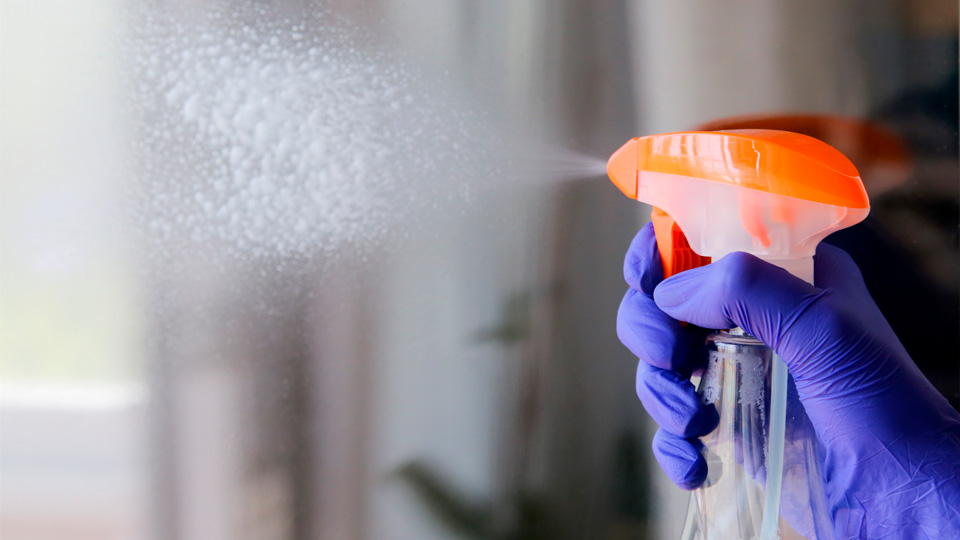Visual filling-in and fading
23/02/2026

10/02/2021
In our day to day we have contact with a large amount of chemical substances that are found in products that we use daily, such as cleaning supplies or personal hygiene. These substances should be treated with extreme caution since misuse or carelessness can cause irritation or eye pain, inflammation of the eye, blurred vision or serious eye injuries.
The first action that must be carried out when handling chemical substances should always be prevention. From the Barraquer Ophthalmology Center we especially recommend the use of protective material, such as glasses, masks and gloves. It is also important to read the instructions for use of the product carefully before handling to know the possible risks.
Within the chemical substances mentioned, a distinction is made between acidic products, which include cleaning materials or batteries, and alkaline products, which bind elements such as lime, fertilizers or dishwasher detergent. Substances of the first category can cause burning eyes. Although they do not usually cause deep tissue damage, they can still cause severe injuries. On the other hand, alkaline substances have a greater incidence in the deeper layers of the tissues and their contact with the eyes can lead to serious eye injuries.
There are three different categories of chemical burns that can affect the eyes. On the one hand, basic substance burns are caused by chemicals that have a high pH. They are the most dangerous since they can go through the eye and affect its vital internal components, causing loss of vision or blindness. Acidic substance burns are caused by elements that have a low pH and are less serious, although they are still dangerous for our eye health, since they can cause significant damage to the cornea. Finally, certain pH-neutral chemicals can cause eye irritation.
In any situation where an eye injury occurs due to contact with chemical substances, the first thing that should be done is a profuse eye wash for at least 20 minutes with mineral water or physiological saline solution. If the affected person wears contact lenses, it is preferable to remove them before washing their eyes. If the lenses cannot be removed, they should also be washed.
When applying first aid it is important to try to keep the eyelids open to prevent the chemical from affecting the conjunctiva or the cornea. It is essential that the affected person go to the emergency room as soon as possible to be treated by an ophthalmologist.
In our day to day we have contact with a large amount of chemical substances that are found in products that we use daily, such as cleaning supplies or personal hygiene. These substances should be treated with extreme caution since misuse or carelessness can cause irritation or eye pain, inflammation of the eye, blurred vision or serious eye injuries.
The first action that must be carried out when handling chemical substances should always be prevention. From the Barraquer Ophthalmology Center we especially recommend the use of protective material, such as glasses, masks and gloves. It is also important to read the instructions for use of the product carefully before handling to know the possible risks.
Within the chemical substances mentioned, a distinction is made between acidic products, which include cleaning materials or batteries, and alkaline products, which bind elements such as lime, fertilizers or dishwasher detergent. Substances of the first category can cause burning eyes. Although they do not usually cause deep tissue damage, they can still cause severe injuries. On the other hand, alkaline substances have a greater incidence in the deeper layers of the tissues and their contact with the eyes can lead to serious eye injuries.
There are three different categories of chemical burns that can affect the eyes. On the one hand, basic substance burns are caused by chemicals that have a high pH. They are the most dangerous since they can go through the eye and affect its vital internal components, causing loss of vision or blindness. Acidic substance burns are caused by elements that have a low pH and are less serious, although they are still dangerous for our eye health, since they can cause significant damage to the cornea. Finally, certain pH-neutral chemicals can cause eye irritation.
In any situation where an eye injury occurs due to contact with chemical substances, the first thing that should be done is a profuse eye wash for at least 20 minutes with mineral water or physiological saline solution. If the affected person wears contact lenses, it is preferable to remove them before washing their eyes. If the lenses cannot be removed, they should also be washed.
When applying first aid it is important to try to keep the eyelids open to prevent the chemical from affecting the conjunctiva or the cornea. It is essential that the affected person go to the emergency room as soon as possible to be treated by an ophthalmologist.